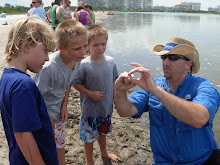I came across this great history lesson about the "birth" of the National Sea Grant College Program and wanted to share it with you.
A Novel Idea: The idea of a Sea Grant College Program
was originally suggested by oceanographer, inventor and writer, Dr. Athelstan
Spilhaus at the 93rd meeting of the American Fisheries Society in 1963. Interest
in the Sea Grant concept grew, much of it sparked by an editorial written by
Spilhaus that appeared in a 1964 issue of Science: " I have suggested the
establishment of ‘sea-grant colleges' in existing universities that wish to
develop oceanic work . . . These would be modernized parallels of the great
developments in agriculture and the mechanic arts which were occasioned by the
Land-Grant Act of about a hundred years ago . . . Establishment of the
land-grant colleges was one of the best investments this nation ever made. That
same kind of imagination and foresight should be applied to exploitation of the
sea."
Thus, at a time when America was excited about science in general, especially the possibility of reaping sustained economic benefits from the vast resources of the seas, national enthusiasm for the Sea Grant College concept grew. In 1965, Sen. Claiborne Pell of Rhode Island introduced legislation to establish Sea Grant colleges on campuses nationwide as centers of excellence in marine and coastal studies. With the adoption in 1966 of the National Sea Grant College Act, Congress established an academic/industry/government partnership that would enhance the nation's education, economy, and environment into the 21st century.
Thus, at a time when America was excited about science in general, especially the possibility of reaping sustained economic benefits from the vast resources of the seas, national enthusiasm for the Sea Grant College concept grew. In 1965, Sen. Claiborne Pell of Rhode Island introduced legislation to establish Sea Grant colleges on campuses nationwide as centers of excellence in marine and coastal studies. With the adoption in 1966 of the National Sea Grant College Act, Congress established an academic/industry/government partnership that would enhance the nation's education, economy, and environment into the 21st century.
A Revolutionary ProgramJust as
our nation's Land Grant institutions have revolutionized agriculture, so too are
the Sea Grant colleges steering our nation toward the productive and sustainable
use of our coastal, marine, and Great Lakes resources, through integrated
programs of scientific research, education and training, and technical
assistance. These programs make available a wealth of information on marine and
aquatic topics—from public school curriculum materials to the most advanced
scientific research. In short, Sea Grant funds high quality research that is
responsive to user needs, bringing university expertise to solve today's marine
environmental problems.
Taken from: (http://www.seagrant.noaa.gov/aboutsg/historyofsg.html)If you'd like to learn more about the National Sea Grant Program visit: http://www.seagrant.noaa.gov/aboutsg/index.html




